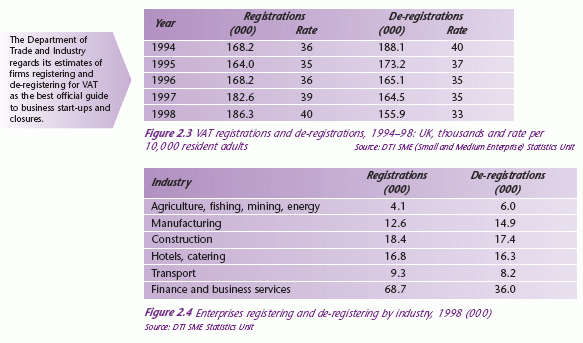Entrepreneurs and profit

Why is profit important to an entrepreneur? It provides a measure of success for the business, as well as acting as an indicator to others. Prospective lenders use the profit figure to decide whether to lend, and potential entrepreneurs look at present profit levels when deciding whether to enter the industry.
Profit, as the reward for taking risk, is not guaranteed: many firms make losses and close. Even when profit is made, it may be small and regarded by the entrepreneur as poor reward for risk-taking: the firm’s profitability is too low. This results in continual change in the structure of the private sector.
Economists view profit as the reward of one of the factors of production (enterprise).

Figure 2.3 shows that there were 186,300 registrations in the UK in 1998, and 155,900 de-registrations (1 in 9 of the businesses registered at the start of the year). The number registered in 1998 had risen by 2% on 1997, to its highest level for five years. Figure 2.4 illustrates the move from the primary and secondary sectors to the tertiary sector. In 1998, the number of registrations fell compared with 1997 in agriculture/fishing (600) and manufacturing (900): in the same period, de-registrations for agriculture/fishing and manufacturing both rose by 100. The net result was a loss of some 4,000 businesses, compared with a net gain of nearly 33,000 in business services: this industry grew by over 100,000 in the five years to 1998, to 1 in 4 of all VAT registered UK businesses.

KEY POINT: Individuals in the private sector try to make profit by acting as entrepreneurs in the market-place. The profit motive forms the foundation of the private sector.
